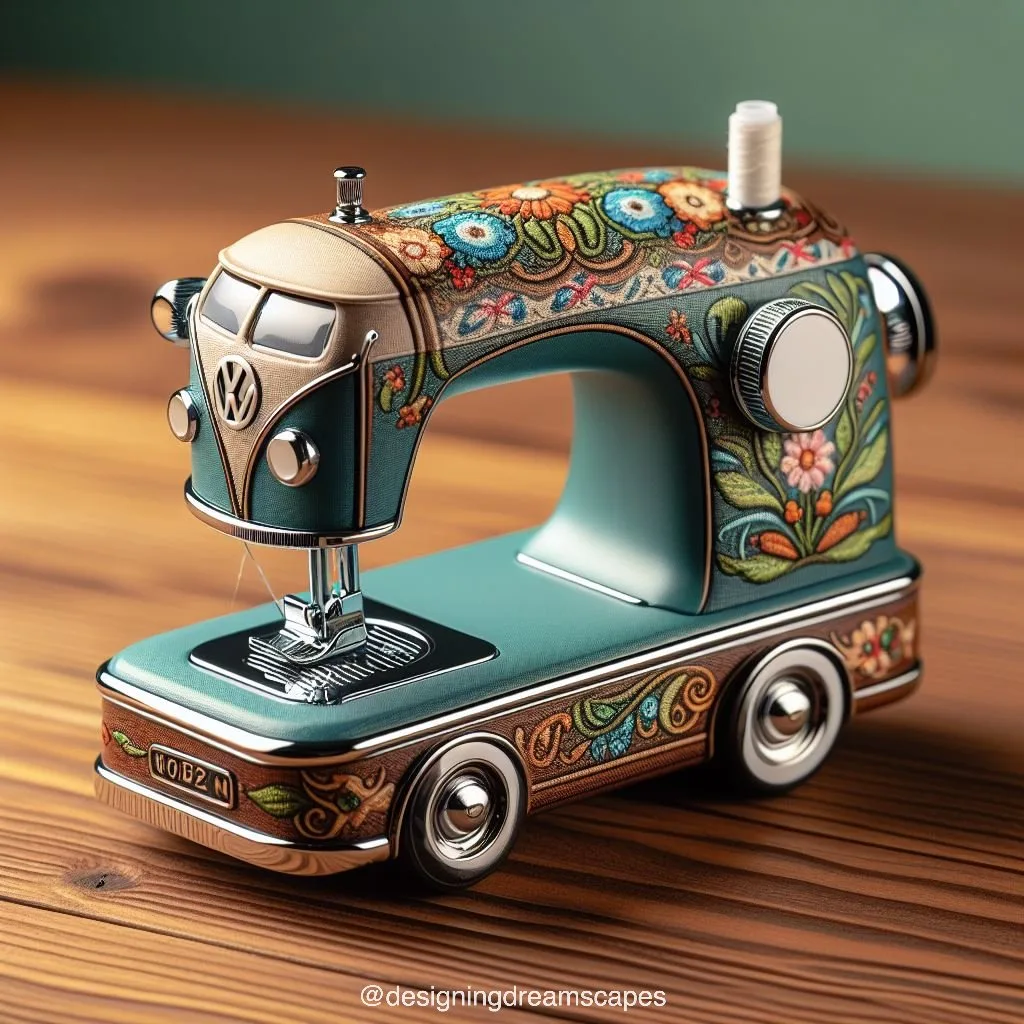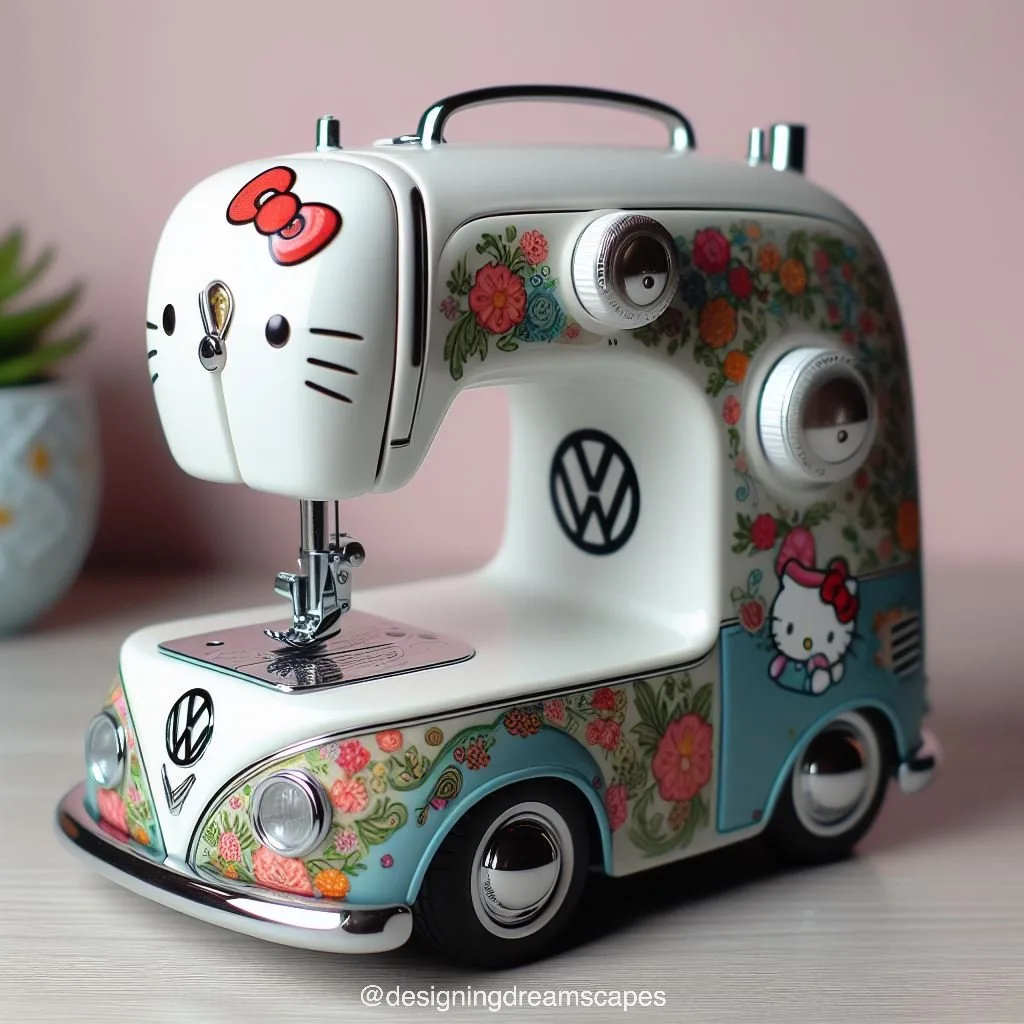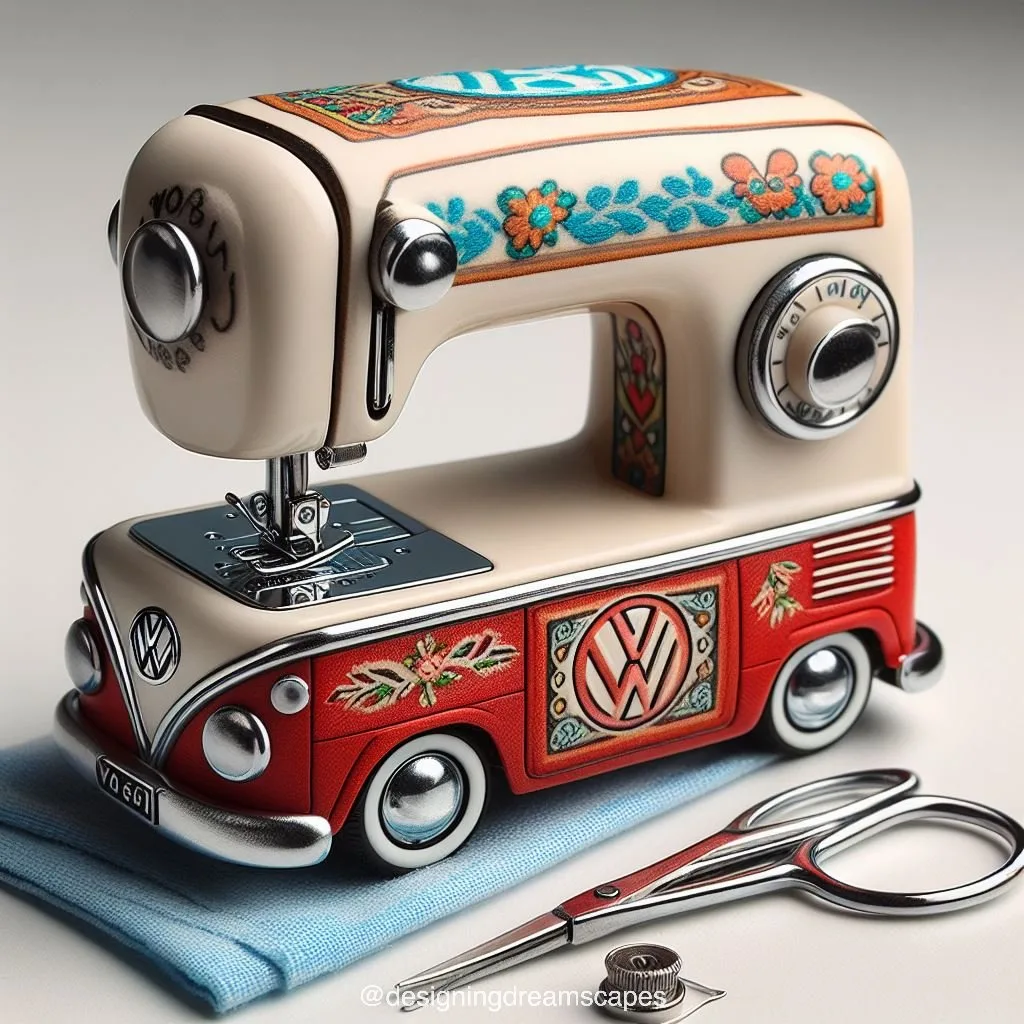When you hear the name Volkswagen, your mind almost instinctively conjures images of iconic automobiles: the dependable Beetle, the versatile Golf, or perhaps the robust Transporter. For decades, this German automotive giant has been synonymous with precision engineering, reliability, and a distinctive approach to vehicle manufacturing that has shaped the global car industry. Yet, what if we told you there’s a fascinating, albeit lesser-known, chapter in Volkswagen’s history that veers sharply from the roaring engines and open roads? What if we spoke of a Volkswagen sewing machine?
The very idea of a "Volkswagen sewing machine" might sound like an automotive urban legend, a quirky piece of trivia that seems too improbable to be true. However, the history of industrial giants is often far more diverse and surprising than their primary products suggest. Many companies, especially those with vast manufacturing capabilities and a history spanning significant global events, have at various points diversified into entirely different sectors. This article delves into the intriguing possibility, the historical context, and the brand philosophy that might connect a car manufacturer to the delicate art of stitching, exploring why such a product, real or rumored, captures our imagination.
Table of Contents
- The Unlikely Alliance: Volkswagen and the Sewing Machine
- A Legacy of Engineering: Why Diversification Makes Sense
- From War Production to Peacetime Goods
- The Myth or Reality of the Volkswagen Sewing Machine
- The Volkswagen Brand: Trust, Reliability, and Public Perception
- Navigating Public Trust: Lessons from the Dieselgate Era
- The Mechanics of Precision: Common Ground Between Cars and Sewing Machines
- The Art of German Engineering: A Shared Philosophy
- Collecting Automotive Memorabilia: The Allure of the Unexpected
- The Online Community: Unraveling Automotive Mysteries
- The Future of Industrial Diversification: Lessons from the Past
The Unlikely Alliance: Volkswagen and the Sewing Machine
The concept of a "Volkswagen sewing machine" immediately sparks curiosity, primarily because it juxtaposes two vastly different industries: heavy automotive manufacturing and precision textile work. While Volkswagen is globally celebrated for its robust vehicles, the idea of them producing a domestic appliance like a sewing machine is not as far-fetched as it might initially seem. Historically, many large industrial conglomerates, especially those established in the early to mid-20th century, often diversified their production lines. Companies like Honda, famous for cars and motorcycles, also produce power equipment, and even aircraft. Similarly, Mitsubishi, a sprawling Japanese keiretsu, has interests ranging from cars to heavy industries, chemicals, and even finance. The underlying principle is often the efficient utilization of manufacturing capabilities, engineering expertise, and established distribution networks. If a company possesses the machinery and skilled labor to produce complex mechanical parts for cars, adapting those capabilities to other mechanical devices, such as a Volkswagen sewing machine, could be a logical, albeit perhaps temporary or niche, extension of their business. This exploration dives into the potential reasons and historical context that might have led to such a unique product, or at least the enduring rumor of its existence, highlighting the breadth of industrial innovation.A Legacy of Engineering: Why Diversification Makes Sense
Volkswagen's reputation is built on a foundation of solid engineering. From the original "People's Car" concept to its modern electric vehicles, the brand has consistently emphasized durable, functional design. This engineering prowess isn't limited to automotive applications. The principles of mechanical design, precision manufacturing, and quality control are universal across many industries. For a company like Volkswagen, with vast foundries, machining capabilities, and a highly skilled workforce, diversifying into other mechanical products could leverage existing assets. During periods of economic shift or post-war reconstruction, companies often sought new markets and products to ensure stability and growth. This strategic flexibility could easily lead to the consideration of products outside their core competency. The notion of a Volkswagen sewing machine, therefore, isn't just a random pairing but potentially a reflection of a broader industrial strategy to maximize production capacity and adapt to changing market demands, utilizing the same meticulous approach to design and assembly that goes into their vehicles.From War Production to Peacetime Goods
The post-World War II era saw many European industrial giants, including those in Germany, pivot their manufacturing capabilities. Factories that once produced military equipment or components were repurposed for civilian goods to aid in reconstruction and meet consumer demand. This period of industrial transformation was ripe for diversification. Companies had vast, often underutilized, manufacturing plants and a workforce skilled in complex assembly. It's not uncommon for a company to produce anything from refrigerators to bicycles or even sewing machines during such times. The need for everyday consumer items was immense, and any company with the means to produce them efficiently would seize the opportunity. This historical context provides a plausible scenario for why a company like Volkswagen, with its immense industrial capacity, might have explored or even briefly engaged in the production of a Volkswagen sewing machine or similar non-automotive goods, transforming their focus from wartime production to goods that would rebuild homes and lives.The Myth or Reality of the Volkswagen Sewing Machine
Despite the intriguing possibility, concrete evidence of a widely produced "Volkswagen sewing machine" is scarce. Unlike their cars, which are meticulously documented and widely recognized, a sewing machine bearing the VW badge remains largely elusive in historical records or collector circles. This leads to a critical question: is it a genuine, albeit rare, historical artifact, or merely an enduring myth born from the general knowledge that industrial companies diversify? It's possible that if such a product existed, it was a very limited production run, perhaps a prototype, or even a re-badged machine manufactured by another company for Volkswagen's internal use or a specific market. The lack of widespread recognition among collectors and historians suggests that it was not a significant commercial venture for the company. However, the persistent rumor itself speaks volumes about Volkswagen's brand perception – one of engineering excellence and reliability, making the idea of them producing a high-quality sewing machine believable to many. The absence of definitive proof often fuels the legend, making the hunt for a genuine Volkswagen sewing machine an intriguing quest for industrial history enthusiasts.The Volkswagen Brand: Trust, Reliability, and Public Perception
The Volkswagen brand carries a significant weight of public perception, shaped by decades of automotive production and, more recently, by challenges to its reputation. For many, especially in Europe and Ireland, as noted by some enthusiasts, "VW's are seen as far more reliable over here in Ireland and Europe than they are over in the States." This sentiment underscores a long-standing trust in Volkswagen's engineering and durability. This perception of reliability and quality is precisely why the idea of a Volkswagen sewing machine holds an appeal – if they can build a robust car, surely they can build a dependable sewing machine. However, the brand's journey hasn't been without its significant hurdles. The "Dieselgate" emissions scandal, where the auto giant admitted in 2015 to cheating emissions tests on 11 million vehicles worldwide, profoundly impacted public trust. Software built into motors made the cars appear to spew fewer harmful pollutants in the lab than they did on the road. This event highlighted the fragility of brand reputation, even for established giants. Despite such challenges, Volkswagen continues to be a dominant force, demonstrating resilience and a commitment to rebuilding trust, which would be essential for any diversified product to succeed.Navigating Public Trust: Lessons from the Dieselgate Era
The emissions scandal, often referred to as "Dieselgate," was a watershed moment for Volkswagen, revealing how software built into motors made the cars appear to spew fewer harmful pollutants in the lab than they actually did. This admission of cheating emissions tests on 11 million vehicles worldwide sent shockwaves through the industry and significantly eroded public trust. For a brand that prided itself on German engineering and reliability, this was a severe blow. The fallout included massive fines, recalls, and a concerted effort by the company to reform its practices and regain consumer confidence. This period serves as a crucial lesson in corporate accountability and the importance of maintaining integrity, regardless of the product line. Had a Volkswagen sewing machine been a prominent product during this time, it too would have inevitably faced scrutiny under the shadow of the scandal, illustrating how a company's overall brand reputation impacts all its ventures, reinforcing the need for unwavering trustworthiness across all products and services.The Mechanics of Precision: Common Ground Between Cars and Sewing Machines
At a fundamental level, both automobiles and sewing machines are complex mechanical devices that rely on precision engineering for optimal performance. A car engine involves intricate timing, synchronized movements of pistons, valves, and gears, all operating within tight tolerances. Similarly, a sewing machine, though smaller in scale, requires equally precise coordination: the needle, bobbin, feed dogs, and tension mechanisms must work in perfect harmony to create a consistent stitch. Both require robust materials, careful assembly, and a design that minimizes friction and wear. A company like Volkswagen, with its deep understanding of metallurgy, gear design, and the dynamics of moving parts, would possess the inherent expertise to design and manufacture a high-quality sewing machine. The transfer of knowledge from automotive engineering to the production of a Volkswagen sewing machine is not just plausible but represents a natural extension of mechanical design principles, emphasizing efficiency, durability, and smooth operation, regardless of the end product's size or purpose.The Art of German Engineering: A Shared Philosophy
German engineering is globally renowned for its meticulousness, innovation, and unwavering commitment to quality. This philosophy permeates industries from automotive to optics, and it would undoubtedly extend to any product bearing the Volkswagen name, including a hypothetical Volkswagen sewing machine. The emphasis is on robust construction, ergonomic design, and long-term reliability. Components are often over-engineered to ensure durability, and the assembly process is characterized by strict quality control. This dedication to excellence is a core part of the Volkswagen identity, contributing to the perception of their vehicles as "far more reliable" in many markets. It’s this very reputation for precision and longevity that makes the idea of a Volkswagen-engineered sewing machine so appealing – one would expect it to be a workhorse, built to last for decades, much like their classic cars. This shared philosophy of engineering excellence provides a strong conceptual link between Volkswagen's primary business and any potential foray into diverse mechanical products.Collecting Automotive Memorabilia: The Allure of the Unexpected
The world of automotive collecting extends far beyond just cars themselves. Enthusiasts often seek out rare and unusual memorabilia that tells a broader story about a brand's history and influence. This can include everything from vintage advertisements and dealership signs to obscure promotional items or, indeed, any non-automotive product that a car company might have produced. The very rarity and unexpected nature of a "Volkswagen sewing machine" would make it a highly coveted item among collectors. Imagine the thrill of discovering a piece that challenges conventional understanding of a brand. Such items become conversation starters, tangible links to a company's industrial past, and a testament to its versatility. The allure lies in the "what if" – the possibility that a global automotive powerhouse briefly ventured into a completely different domain, leaving behind a unique artifact. For those dedicated to preserving automotive history, finding such an anomaly would be a significant achievement, adding a fascinating dimension to their collection and sparking endless discussions within the community.The Online Community: Unraveling Automotive Mysteries
In the digital age, online communities play a crucial role in preserving history, sharing knowledge, and unraveling mysteries, even those as niche as a potential "Volkswagen sewing machine." Forums dedicated to all Volkswagen owners and enthusiasts, like those found on Reddit or independent platforms, serve as vibrant hubs for discussion about performance, builds, modifications, troubleshooting, and maintenance. These communities are where collective knowledge resides. If a Volkswagen sewing machine truly existed, these are the places where whispers would turn into discussions, where someone might post a blurry photo, or where an elder enthusiast might recall a fleeting memory. The moderation teams, such as those on r/volkswagen, often implement measures like account age restrictions for certain post types to maintain quality and prevent spam, ensuring that discussions remain focused and trustworthy. It's in these dedicated spaces, where people "come join the discussion about performance, builds, modifications, classifieds, troubleshooting, maintenance, new," that the most obscure facts about a brand's history, including its less-known products, are often unearthed and verified through collaborative effort and shared passion.The Future of Industrial Diversification: Lessons from the Past
The intriguing possibility of a Volkswagen sewing machine, whether a widespread product or a rare curiosity, offers valuable insights into the broader landscape of industrial diversification. It highlights how companies, driven by economic necessity, strategic opportunity, or the sheer breadth of their engineering capabilities, can venture far beyond their core business. In an era of rapid technological change and evolving consumer demands, the ability to adapt and innovate across different sectors remains crucial for corporate survival and growth. Volkswagen itself continues to diversify, investing heavily in electric vehicles, software development, and mobility services, moving beyond traditional internal combustion engines. The lessons from history, including the less-known forays into products like a potential Volkswagen sewing machine, underscore the importance of flexibility, leveraging core competencies, and responding to market needs. While the sewing machine might remain a delightful historical footnote or a persistent rumor, it serves as a reminder that industrial giants are often more multifaceted than their most famous products suggest, always seeking new avenues for innovation and impact.Conclusion
The journey to uncover the truth behind the "Volkswagen sewing machine" leads us through a fascinating exploration of industrial history, brand perception, and the enduring power of engineering excellence. While concrete, widespread evidence of such a product remains elusive, the very notion sparks curiosity and highlights the often-unseen diversification efforts of major manufacturers. Volkswagen, a name synonymous with automotive reliability and German precision, embodies the kind of industrial might that could indeed have produced a high-quality sewing machine, leveraging its expertise in mechanical design and manufacturing. Whether a widely distributed product or a rare, almost mythical artifact, the Volkswagen sewing machine serves as a compelling thought experiment, connecting the roar of an engine to the hum of a needle. It reminds us that companies are complex entities, often shaped by historical contexts and strategic decisions that extend far beyond their most famous offerings. This intriguing piece of potential history enriches our understanding of Volkswagen's legacy and the broader narrative of industrial innovation. What are your thoughts? Have you ever encountered a Volkswagen sewing machine, or heard more about its story? Share your insights and join the discussion in the comments below. Your contributions help unravel these historical mysteries and enrich our collective knowledge. Don't forget to explore other fascinating stories on our site about unexpected industrial ventures and the evolution of iconic brands!


Detail Author:
- Name : Jazmyn Lubowitz DDS
- Username : rick.mcdermott
- Email : satterfield.mallory@medhurst.com
- Birthdate : 2002-04-11
- Address : 319 Padberg Views West Rafaela, NE 57703-2739
- Phone : 1-816-364-2182
- Company : Auer Inc
- Job : Amusement Attendant
- Bio : Id voluptas ad dolore explicabo. Quod ea et hic.
Socials
instagram:
- url : https://instagram.com/yasmin.gleichner
- username : yasmin.gleichner
- bio : Quo tempore consequatur eum accusamus eius omnis. Quia sint et recusandae optio et.
- followers : 2995
- following : 2826
twitter:
- url : https://twitter.com/ygleichner
- username : ygleichner
- bio : Nihil expedita praesentium asperiores ducimus ex consequatur. Inventore blanditiis asperiores quidem aut. Sed est alias molestiae sapiente.
- followers : 5009
- following : 1542